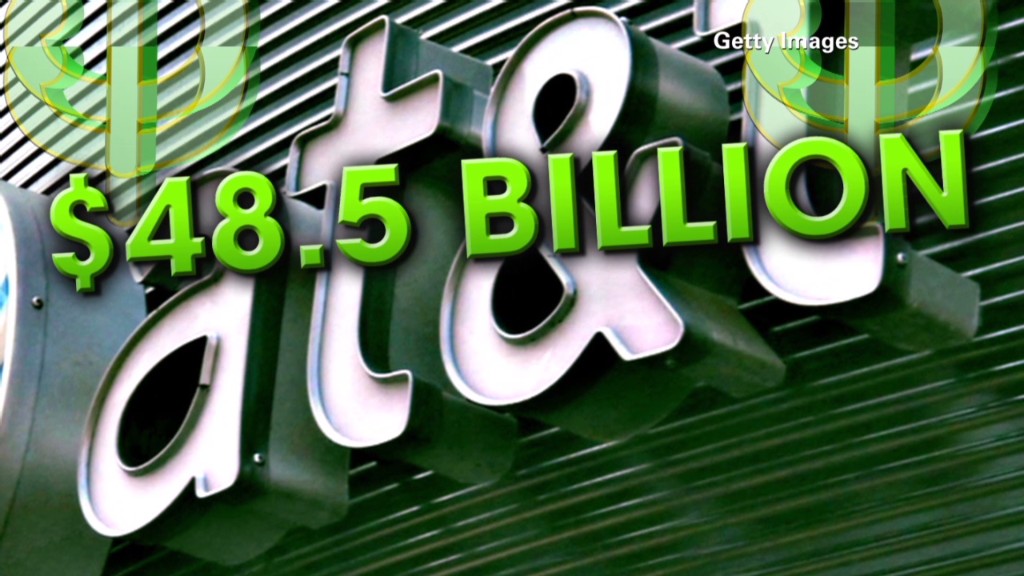
If approved by regulators, AT&T's $49 billion bid for DirecTV would be the fourth-biggest telecommunications merger in history. So everybody has an opinion about it.
Sunday's deal announcement stirred enthusiasm, opposition and above all else curiosity about what the combination of AT&T (T) and DirecTV (DTV) could look like. The House Judiciary Committee immediately said that it would hold a hearing to scrutinize the deal.
In the short term, the deal is unlikely to affect either company's customers. But the long term is another story.
AT&T -- like its rivals Verizon (VZ) and Comcast (CMCSA) -- clearly wants to sell bundles of broadband and television that deliver on the promise of anything/anytime/anywhere programming.
Wall Street analysts pointed to a number of other motivations for the deal.
"While this transaction has some strategic merits, it appears more to be structured to enhance AT&T's financial position," Vijay Jayant of ISI Group said in a note to investors.
Craig Moffett of MoffettNathanson agreed -- he commented last week that AT&T is "in dire need of a cash producer to sustain their dividend."
In a telephone interview on Sunday night, Moffett said he was struggling to find "greater meaning" in the deal.
"It's a huge transaction, but I think it's very unlikely to change the landscape of pay TV very much," he said.
DirecTV's largest shareholder, Warren Buffett's Berkshire Hathaway (BRKB), seemed pleased by the deal.
"This is a terrific transaction for all involved: Enhanced choice for consumers coupled with increased value for both AT&T and DirecTV shareholders -- a natural," said Berkshire investment managers Todd Combs and Ted Weschler in a joint statement. Berkshire also disclosed last week that it just acquired a stake in Verizon as well.
Related: 4 ways a fast lane could change your Internet service

AT&T's bid for DirecTV -- the No. 1 satellite TV provider in the United States -- comes right on the heels of Comcast's bid for Time Warner Cable (TWC), which would join the No. 1 and No. 2 cable TV providers.
Peter Lauria, a longtime media industry reporter who now writes for BuzzFeed, said Comcast might want to write AT&T a thank you note: "AT&T is indirectly making Comcast's case to regulators that it should be allowed to acquire Time Warner Cable because competition is increasing."
Comcast declined to comment on AT&T's announcement.
Senator Al Franken, a vocal opponent of the Comcast bid, said Monday on CNN's "New Day" that he is "very skeptical" about the DirecTV sale, as well.
Consolidation "usually leads to higher fees for consumers" and fewer choices, he said.
"The fewer players there are in the space, I believe the worse it is for consumers. And my constituents in Minnesota will be paying more for cable. This is a bad trend," Franken said.
Public interest groups that share Franken's concerns also spoke up. "The industry needs more competition, not more mergers," the nonprofit Public Knowledge said in a statement. "The burden is on AT&T and DirecTV to show otherwise. We'll have to analyze this carefully for potential harms both to the video programming and the wireless markets."
Related: Weather Channel coming back to DirecTV
That's what the House Judiciary Committee said it would do -- to "ensure that consumers' interests are protected in an increasingly consolidated telecommunications marketplace."
The Senate Judiciary Committee will likely hold a similar hearing.
AT&T and DirecTV executives have expressed confidence that the deal will gain the necessary support in Washington.
The wireless company is eager to experiment with new forms of video distribution, and by gaining DirecTV, it will gain millions of new customers. (DirecTV serves about 20 million households.)
Whether people want to sit back and watch live TV on a big screen, Netflix-style on a smart phone, or some other way that's still being dreamed up, AT&T wants to have a stake in it. Of course, other companies do too.
There's been an expectation that both of the country's satellite providers, DirecTV and Dish Network (DISH), would either merge or be acquired by a third party. So AT&T's bid for DirecTV instantly raised questions about what Dish might do next.
"It's kind of an arms race," Guggenheim Partners analyst Paul Gallant said Sunday. "If regulators decide they're OK with Comcast-TWC, then AT&T-DirecTV starts to look like a nice counterweight to the bulked-up Comcast."

